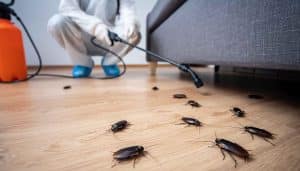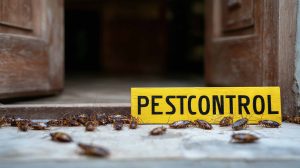With its warm summers, mild winters, and fertile soils is a gardener’s dream. But these same conditions make the environment more attractive to pests.
Aphids, slugs, and many other pests may start appearing, and local gardens can quickly face infestations if not managed properly. Since chemicals can harm plants, helpful insects, pets, family, and even soil health, it’s better to choose natural solutions.
Whether you grow vegetables, fruit trees, or ornamental plants, adopting eco-friendly pest control methods is essential, and if the infestation is beyond control, you must call professional pest control. They help with a targeted, eco-friendly, and pet-friendly solution that can help keep the pests away, for good, without damaging your garden.
Let’s talk a little more about a few DIY tricks that can help keep your garden pest-free.
Common Garden Pests You Must Watch For
Garden pests can damage healthy plants. But how do you know what to look for? Here are some common pests found in the garden
- Moths: Lay eggs that hatch into leaf-eating larvae.
- Whiteflies: They are small, winged insects hiding under leaves.
- Cutworms: Hide in soil and cut seedlings at the base overnight.
- Slugs And Snails: They chew irregular holes in leaves and stems.
- Aphids: They are tiny sap-suckers that cluster on stems and leaves.
- Mealybugs: Cotton-like clusters that weaken plants by feeding on sap.
- Caterpillars: They are voracious feeders that strip leaves and damage fruit.
- Spider Mites: Minute pests that create fine webs and cause leaf discoloration.
If you suspect these in your garden, call for a pest inspection immediately.
| Let us handle your pest problem – Contact our Pest Control Team Now! |
Why Do Pests Infest Gardens?
Insects and pests love being around greenery. But what are the other reasons? Let’s find out –
- Warmth: Some pests look for warmth. Hence, they live deep in the garden soil, bushes, or plants.
- Food: Insects love feeding on wood and leaves, and the garden is the best place to thrive and live.
- Easy Hideouts: Tiny pests like aphids and mosquitoes love to hide behind the leaves and the bushes.
- Moisture: Insects, such as mosquitoes, cockroaches, termites, and rodents, need moisture to grow and breed. That’s why they prefer living in the garden.
9 Ways You Can Keep The Pests Out Of Your Garden
1. Companion Planting
Companion planting is a natural way to deter pests while increasing the health of the garden. Certain plants release scents or chemicals that confuse insects and keep them away from your crops. For example, marigolds repel nematodes and beetles, while basil can help keep mosquitoes and flies at bay.
Garlic and onions are also considered best, as they keep aphids and even rabbits away from your garden. If you think companion plants only help to keep the insects away, then you must know that they also invite pollinators and enhance soil health. Apart from deterring pests, companion planting makes your garden look vibrant and beautiful.
2. Neem Oil Spray
Neem oil is considered the safest way to repel insects and pests from your gardens. This oil disrupts the insect life cycles and does not harm plants, pets, or beneficial bugs, such as bees, when used properly. If you have aphids, whiteflies, mites, and caterpillars in your garden, well, this is the exact remedy you need.
You can either buy one from your nearest departmental store or make one at home. Here’s how to do it –
- Take a spray bottle.
- Add neem oil to water.
- Shake the bottle until the mixture is well combined.
- Lastly, spray generously all over the plant (including leaves and stems)
You can apply it every -14 days, especially if it has rained. Since it’s biodegradable, neem oil breaks down quickly and leaves no harmful residue behind.
3. Diatomaceous Earth
Diatomaceous earth is a fine, powdery substance that is made from fossilized algae. It is completely safe for humans and plants but deadly for soft-bodied pests like slugs, ants, and beetles. When insects crawl over it, the powder damages their exoskeleton, leading to dehydration.
All you need to do is sprinkle it around the base of your plants or along garden borders to create a protective barrier. Always sprinkle it after a rain or watering the plant, after the soil has dried up. It is non-toxic, affordable, and easy to use. Plus, it doesn’t poison your soil or harm your vegetables.
4. Beneficial Insects
Not all bugs are bad. Don’t believe us? Well, some bugs are actually your best defense against garden pests. Ladybugs, lacewings, praying mantises, etc, are natural predators of aphids, mites, and caterpillars. To attract these insects, all you need to do is plant fennel, dill, and yarrow. They can also be bought from your local nurseries.
They help maintain a balance, and there’s no need for using chemical sprays. Additionally, beneficial insects support biodiversity and create a lively garden ecosystem.
5. Row Covers And Barriers
Row covers and mesh barriers block pests like beetles, caterpillars, and moths from attacking your plants and vegetables. You can opt for lightweight fabrics or fine netting, as they let sunlight, air, and rain pass through while keeping unwanted insects out. This is useful during the early growing season when young plants are most vulnerable.
You can also use collars around seedlings to stop cutworms or copper tape around beds to deter slugs. These barriers don’t rely on chemicals, so your plants stay safe and healthy. Plus, they’re reusable season after season, which makes them an affordable and smart investment.
6. Regular Garden Checks
Every morning, just take a walk through your garden, as it gives you an opportunity to check under leaves, along stems, and around the soil. This helps you catch the problems before they become infestations.
You can handpick any pests or insects, such as beetles, snails, or caterpillars, which is surprisingly effective and requires no chemicals. Checking the garden also means you can spot signs of disease or nutrient deficiencies before they spread. You can also call for a pest inspection if you don’t know what to look for!
7. Homemade Sprays
Homemade sprays can be powerful against common pests. A simple mix of water and mild soap creates an effective solution that suffocates soft-bodied pests like spider mites and aphids. Also, garlic and chilli pepper sprays can be effective, without causing any harm to the plants. You can even use vinegar diluted with water to discourage ants and slugs.
They are cost-effective, easy to make, and safe for vegetables, flowers, and herbs. But before you put the sprays to use, always do a patch test.
Here’s how to do it –
- Apply the spray to the lower side of the leaf.
- Wait for a few minutes.
- If you find a burnt or discolored leaf, don’t use it.
- You can also adjust the quantity to make the solution usable.
Note: Spray in the early morning or late evening, and avoid any direct sunlight. This is because they can sometimes scorch delicate leaves.
8. Healthy Soil Practices
Healthy plants naturally resist pests better than weak ones, so start from the ground up. Use compost to enrich your soil with nutrients and maintain proper moisture levels. Rotate your crops each season to prevent pests from settling into predictable patterns.
You can also consider mulches. It helps keep your soil fertile and well-aerated. It also conserves water and deters insects like cutworms and slugs. It also attracts earthworms and microbes that strengthen plant immunity. You can also get in touch with a professional pest control service to help you advise on some healthy soil practices.
9. Professional Help When Needed
Sometimes pests can get out of hand despite your best efforts. That’s when calling in experts makes sense. Local pest control can help you identify issues early and recommend eco-friendly treatments. Call them in case you think you’re unable to find the pest and still see your crops failing.
A professional often uses targeted methods that minimize harm to plants and beneficial insects while solving the problem quickly. If your garden faces repeated invasions of termites, borers, or pests, professional guidance can save your plants and reduce stress.
| Worried About Pests? Book Our Service To Enjoy Lasting Results |
Complementary Garden Practices
Methods | How Does It Help? |
Smart Watering | Prevents waterlogging that attracts slugs, snails, and root pests while keeping soil balanced. |
Seasonal Planting | Avoids peak pest activity and reduces crop vulnerability |
Proper Pruning | Improves airflow, lowering humidity in which pests and fungal diseases thrive. |
Raised Beds | Keeps the soil-borne pests and improves drainage |
Mulching | Retains soil moisture, suppresses weeds, and creates a barrier against crawling pests |
Why Choose Natural Ways To Get Rid Of Pests?
Well, the answer is simple – natural ways are safer than chemicals. Most home gardeners prefer natural ways to deter pests over chemicals, as they are gentle on the crops and do not contaminate the environment.
Chemicals often harm beneficial insects, such as bees and butterflies. Natural pest control creates a safe space for pollinators to thrive while keeping harmful bugs away. A garden buzzing with life is always a good sign.
Plus, natural pesticides are non-toxic and easy to apply, and you’ll get most of the ingredients from your kitchen cabinet. Moreover, going non-toxic is a responsible choice.
Tips To Keep Pests Away For Longer
Here are some tips to keep the pests away from your garden –
- Always keep your gardening tools sanitized after every use.
- Always inspect your plants, as it can prevent any early invasion.
- Overusing pesticides like nitrogen leads to lush green growth that attracts pests
- Rotate between different pesticides to maintain effectiveness, as using only one remedy can lead to resistance.
- Try watering in the morning, as it allows the plants to dry during the day. This reduces fungal infection that may attract pests.
Common Questions Homeowners Ask!
1. Can I Use Vinegar As Pest Control?
Ans. Vinegar is the best weed killer and also deters pests from your garden. However, it is very acidic, which might harm the plants. So, it is advised to dilute it in water well before using. Also, most homeowners do not recommend using them as a pest deterrent in a vegetable garden.
2. What Smell Do Insects Hate?
Ans. Insects hate the smells of citronella oil, lavender oil, peppermint oil, tea tree oil, and neem oil. You can either use them alone or as a spray by diluting them in water.
3. Does Cinnamon Repel Bugs?
Ans. Yes. Cinnamon contains eugenol, which is an aromatic compound that is found in traditional insect and bug repellents.
Pest Control Service Areas! | ||
Takeaway
Keeping your garden pest-free doesn’t mean you have to use harsh chemicals. There are plenty of natural ways to stop pests from taking over. With the region’s fertile soil and warm climate attracting pests, you must take a proactive approach to make sure your garden thrives.
Read More About:
- What Differentiates Pest Control from Extermination Services?
- How Often Should You Do Pest Control?
- Is It Worth Getting Pest Control?
- Who is responsible for pest control: landlords or tenants?
Get In Touch With Finley Pest Control To Keep Your Garden Healthy And Thriving!
If pests overrun your garden, don’t worry! Finley Pest Control, will help you get rid of these bothersome pests. Our certified and experienced team professionals use proven and responsible methods to eliminate pests from your garden and home.
For pest control, we follow an Integrated Pest Management (IPM) approach where we combine inspections, targeted treatments, prevention strategies, and proactive follow-ups for the best results.
We have a 4.9 out of 5 stars rating on Google because our customers love our work, and we are also accredited by the Better Business Bureau (BBB).
We proudly offer our pest control in Loomis with over 25 years of hands-on experience and 11 years in business, we have built a reputation with lasting results and 100% customer satisfaction.
Call 916-741-2847 to request a free estimate today.








